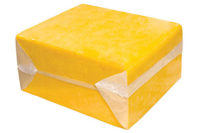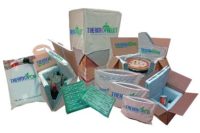Meat and cheese processors can now get top grades on environmental scorecards and improve package performance with new Eco-Tite shrink bags from Curwood. Eco-Tite bags eliminate PVdC (polyvinylidene chloride) and use 25% to 33% less material than traditional shrink bags, helping processors meet aggressive sustainability goals. Eco-Tite bags are ideal for most applications where traditional shrink bags are used.
Performance benefits of Eco-Tite bags include superior sealability, barrier, abrasion resistance and aesthetics compared to traditional bags. The multilayer Eco-Tite structure includes a durable outer layer to resist puncture and abrasion; an EVOH layer for superior oxygen barrier without PVdC; and a high-flow sealant layer for excellent caulking and sealing under a wider range of sealing conditions. Eco-Tite bags also feature excellent shrink for a tight fit with minimal dog ears, plus brilliant clarity and gloss for an outstanding product presentation.
Eco-Tite bags are thinner and stronger than conventional bags, which allows for significant downgauging. The downgauged material improves the product-to-package ratio so more bags fit in a carton and on a pallet, reducing warehousing and shipping costs.
Because Eco-Tite bags feature a high-flow sealant, they seal better through wrinkles and folds to reduce leakers, reworks and waste. This is an especially significant benefit for high-profile products that tend to create more folds in the seal area of the bag. And since Eco-Tite bags seal at lower temperatures, processors can save energy and/or accelerate machine speeds. Eco-Tite bags’ heat-resistant outer layer keeps bags from sealing to themselves if they are overlapped in the sealing chamber.
Eco-Tite bags were first developed to meet the stringent need for chlorine-free packaging in Europe. PVdC, a common material used in barrier packaging, can contaminate recycling streams and release carcinogens when incinerated. Eco-Tite bags’ EVOH barrier layer eliminates this concern.
Get our new eMagazine delivered to your inbox every month.
Stay in the know on the latest dairy industry trends.
SUBSCRIBE TODAYCopyright ©2024. All Rights Reserved BNP Media.
Design, CMS, Hosting & Web Development :: ePublishing

